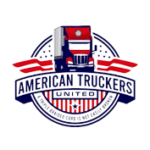Crash Data
the Broken Road
America’s Highway Safety Epidemic
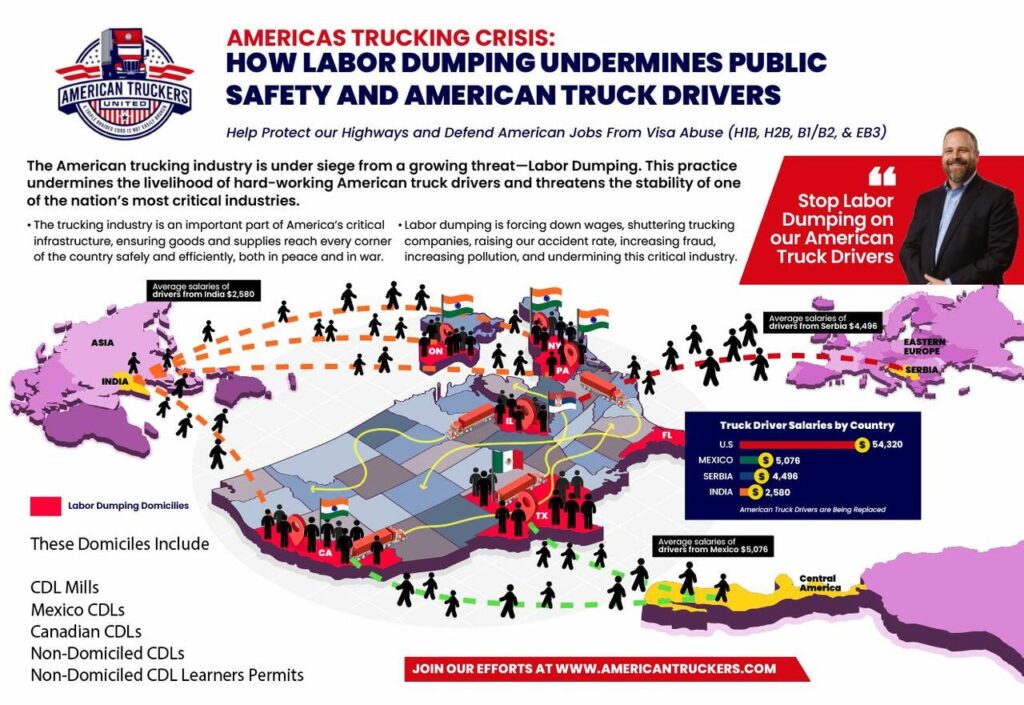
Over the past eight years, there has been an alarming increase in fatal truck crashes, despite the introduction of advanced safety technologies like lane departure systems, collision avoidance mechanisms, cameras, and electronic logging devices designed to enhance road safety. This rise in crashes might seem counterintuitive given these technological advancements. However, a significant factor contributing to this trend can be attributed to open borders and rampant labor dumping within the trucking industry. Labor dumping has led to the illegal employment of untrained, unvetted, and often unlicensed drivers who are hired to cut costs and maximize profits. This practice undermines the potential benefits of new safety technologies by placing inexperienced or unqualified drivers behind the wheels of large, complex vehicles, thereby not only nullifying the advancements in truck safety technology but also increasing the likelihood of accidents on the roads. This situation highlights the complex interplay between economic practices in the trucking industry and road safety, suggesting that technological solutions alone are insufficient without addressing underlying labor issues.
Labor dumping has dire implications for public safety, especially on our roads. Every day, trucks share the highways with countless motorists, and any lapse in driver standards due to relaxed standards can lead to catastrophic outcomes.
For instance, a tragic example occurred on May 13, 2024, on Arkansas 117 in Lawrence County. Mark Bryant, a 52-year-old from Jonesboro, lost his life when his Ford F-150 was struck by a Freightliner that veered across the centerline. The Freightliner was operated by a 26-year-old from Honduras, who was illegally in the country, lacked a valid U.S. Commercial Driver’s License (CDL), had no recent medical certification, and couldn’t communicate in English. This driver worked for a company frequently cited for bypassing regulations by hiring drivers without proper U.S. CDLs.
Similarly, in Colorado, the community mourned the loss of Scott Miller, aged 62, killed by an individual who not only lacked a U.S. CDL but had also been deported 16 times and was under a deportation order at the time of the accident. These cases have revealed a recurring pattern where drivers involved in such fatal accidents face only minor charges despite their illegal status and negligence leading to loss of life.
These incidents point to gross negligence in the enforcement of transportation safety regulations and immigration laws. They expose how systemic failures can lead to tragic outcomes, emphasizing the need for stricter oversight in the hiring practices of trucking companies, the sourcing practices of shippers, and more robust border control measures to prevent individuals who repeatedly violate immigration laws from causing harm on U.S. roads.
Key Industry Shifts Over the Last 8 Years:
- Qualification – Drivers without a U.S. Commercial Driver’s License (CDL) are being allowed to operate on U.S. roadways without U.S. Training and Qualification. Most everyone you meet in your local communities are completely unaware their families are being exposed to this hazard.
- Licensing Mills – Mostly border states are granting U.S. Commercial Driver’s Licenses with little to no training, no English language requirement, and no limits to the numbers they can issue. Canada licensing mills are issuing Canadian CDL’s to Non-Canadian immigrants for work in the United States.
- Foreign CDLs – Many of these drivers are operating on Tourist Visa’s not authorized for work in the US. There is no enforcement agency conducting Visa inspections or validation. If we cannot validate the authenticity of the documents and the identity of the individual then they should not be allowed.
- Non-Domicile CDLs – ATU has identified 10 states (CA,OR,NV,NY,PA,IL,MN,TX & FL) as being responsible for issuing an explicable number of cdls to non-citizens
- No Enforcement – The FMCSA is not enforcing English language requirements, Commercial Driver’s License qualification requirements, or Cabotage rules.
- Leadership – Industry leadership is completely ignoring the issue leaving American Drivers, American Carriers, and the motoring public without representation
Benchmarked Policy Moment – FMCSA Memorandum MC-ECE-2016-006, issued on June 15, 2016, concerning English Language Proficiency Testing and Enforcement Policy. This policy, which supersedes prior directives on the enforcement of 49 CFR 391.11(b)(2) related to English language requirements for commercial drivers, has introduced an imminent hazard to highway safety. The memorandum removed the out-of-service violation for enforcement action when a truck driver is unable to read or speak the English language. Ultimately, this policy knowingly allows these drivers on the highway when they are unable to read our highway road signs!
Large Truck Crash Data
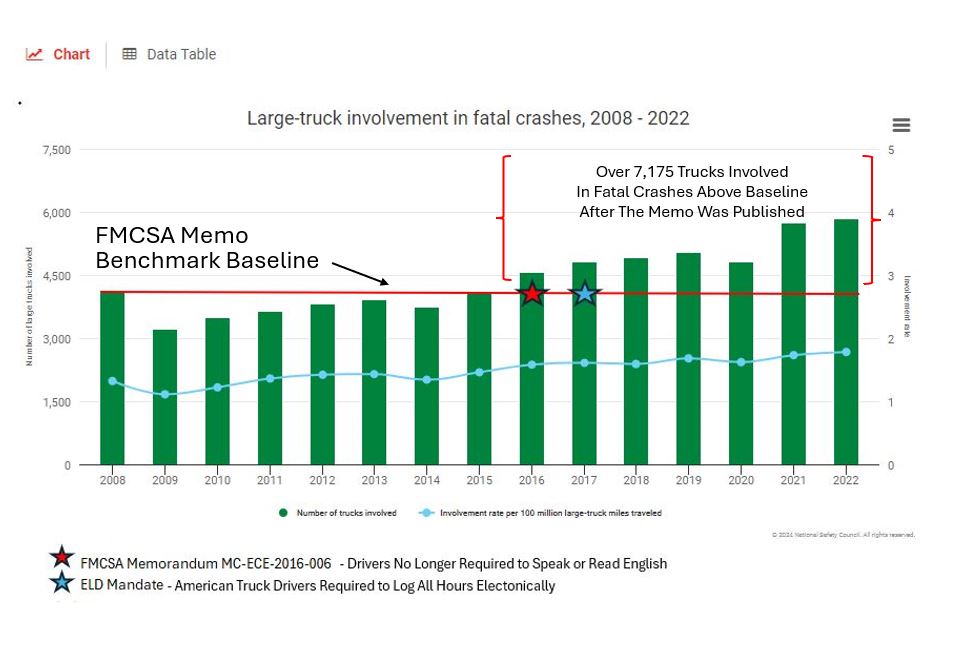
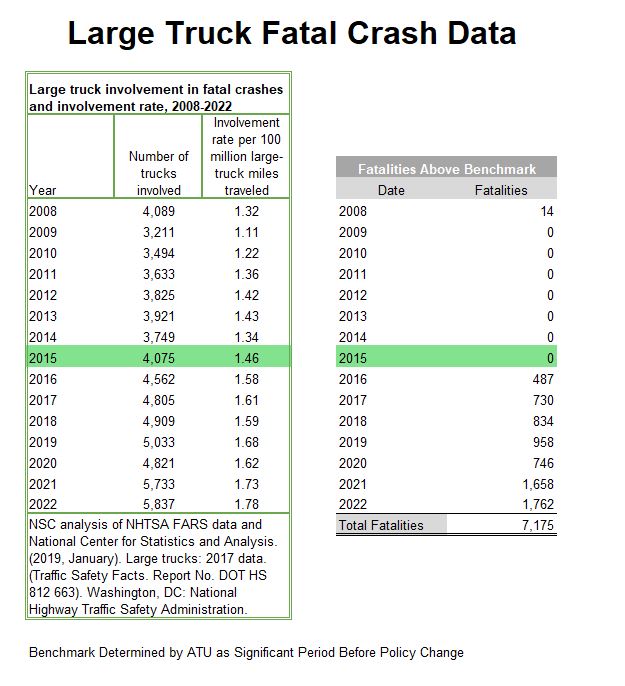
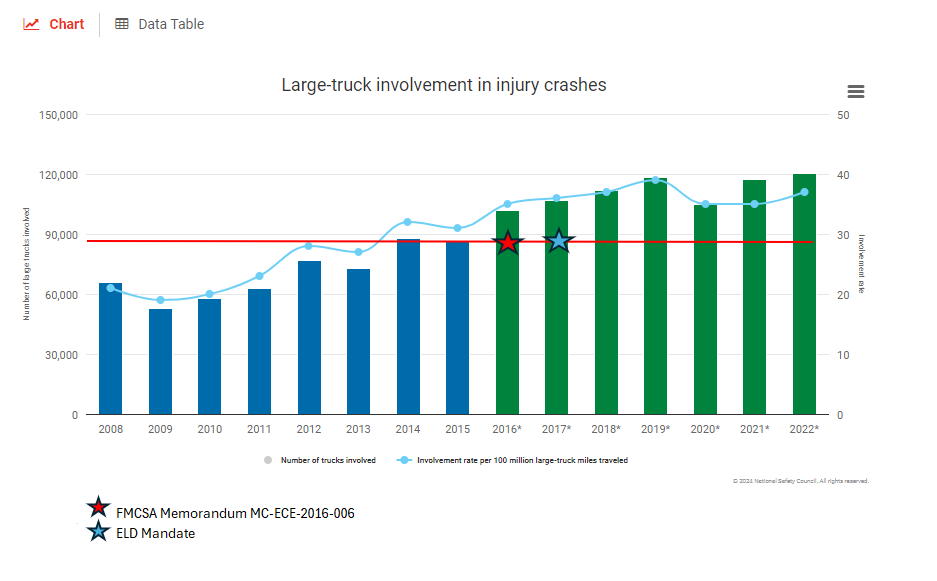
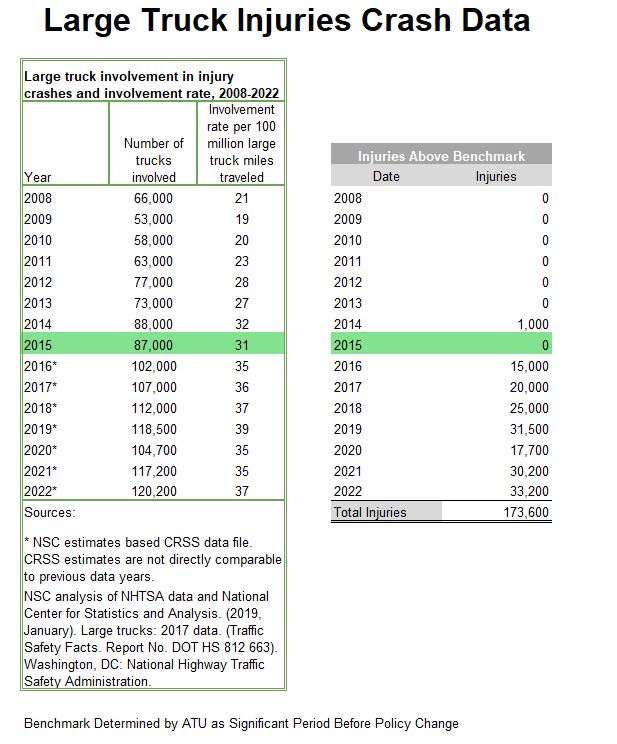
Source Data – https://injuryfacts.nsc.org/motor-vehicle/road-users/large-trucks/
